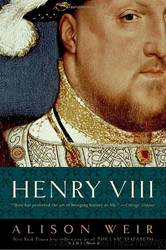Henry VIII by Alison Weir

Author:Alison Weir [Weir, Alison]
Language: eng
Format: epub
Tags: Non Fiction
Publisher: Alison Weir
38
“Squire Harry Will Be God, and Do as He Pleases!”
It was around 1530 that a former servant of Wolsey’s, Thomas Cromwell, entered the King’s service. One of the most able ministers any king ever had, Cromwell was the son of a Putney blacksmith and had been born around 1485; his sister Katherine was the wife of a local innkeeper, Morgan Williams, and they would be among the ancestors of the Lord Protector Oliver Cromwell. In youth, Thomas Cromwell had travelled in Italy, where he learned much about banking, became acquainted with the works of Machiavelli, whom he much admired, and found employment as a mercenary; he later told Cranmer “what a ruffian he had been in his young days.”1 When he returned home in 1512, he settled down and set himself up as a lawyer, merchant, moneylender, and fuller.2
In 1514, Cromwell had entered Wolsey’s service as Collector of the Revenues of the archdiocese of York, and proved himself to be efficient and astute. From 1523, he was M.P. for Taunton. Around this time, he was working with Wolsey to suppress several minor religious houses in order to raise funds for Cardinal College.
Cromwell’s genius for administration and finance was what endeared him to the King, who was impressed by the way in which he had stayed loyal to his former master and tied up his affairs. Moreover, Cromwell was pragmatic, knowledgeable, hardheaded, and often ruthless; like Wolsey, he was a hardworking businessman with a talent for management. The King quickly perceived that he could fill the gap left by the Cardinal, and, after a series of interviews, appointed him to the Privy Council.3 Thereafter he “grew continually in the King’s favour,”4 and also became a focus for those who had supported Wolsey, such as Russell, Heneage, and Page. Cromwell was not a member of the Privy Chamber, but thanks to the allegiance of such men, he was in a better position than Wolsey to lead a Privy Chamber faction.
Cromwell’s portraits show a thickset, portly man with heavy jowls, a small, severe mouth, and porcine eyes. They do not reveal his hearty manner, nor his skill at dealing with people. Chapuys recorded that in conversation his innate reserve would give way to jovial banter and animated expressions: “he is a person of good cheer, gracious in words and generous in actions.”5
Although he was not university educated, Cromwell spoke Latin, French, Italian, and some Greek, and was cultivated enough to hold his own with the likes of Kratzer, Dr. Butts, and, later, Holbein, who were all regular guests at his table. After the death of his wife, Elizabeth Wykes, in 1527, he never remarried, but may have taken mistresses. When he was due to stay with Norfolk at York in 1537, the Duke wrote, with wry humour, “And if ye lust not to dally with my wife,” he could supply for his guest’s comfort “a young woman with pretty proper tetins [breasts].” 6 Yet the jovial, urbane exterior masked a calculating mind that could remain coldly detached from human considerations when making political decisions.
Download
This site does not store any files on its server. We only index and link to content provided by other sites. Please contact the content providers to delete copyright contents if any and email us, we'll remove relevant links or contents immediately.
| Military | Political |
| Presidents & Heads of State | Religious |
| Rich & Famous | Royalty |
| Social Activists |
Waking Up in Heaven: A True Story of Brokenness, Heaven, and Life Again by McVea Crystal & Tresniowski Alex(37013)
Empire of the Sikhs by Patwant Singh(22176)
We're Going to Need More Wine by Gabrielle Union(18081)
Hans Sturm: A Soldier's Odyssey on the Eastern Front by Gordon Williamson(16727)
Leonardo da Vinci by Walter Isaacson(11913)
The Radium Girls by Kate Moore(10914)
Educated by Tara Westover(7073)
Tools of Titans by Timothy Ferriss(6957)
How to Be a Bawse: A Guide to Conquering Life by Lilly Singh(6698)
The Last Black Unicorn by Tiffany Haddish(5078)
Permanent Record by Edward Snowden(5004)
The Rise and Fall of Senator Joe McCarthy by James Cross Giblin(4851)
Promise Me, Dad by Joe Biden(4453)
The Wind in My Hair by Masih Alinejad(4427)
The Crown by Robert Lacey(4111)
A Higher Loyalty: Truth, Lies, and Leadership by James Comey(4038)
The Iron Duke by The Iron Duke(3642)
Joan of Arc by Mary Gordon(3263)
How to be Champion: My Autobiography by Sarah Millican(3191)
